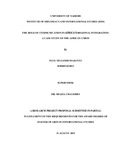| dc.description.abstract | The world is currently witnessing a renaissance of regionalism and integration schemes.
Regionalism has become popular as states seek closer economic and political ties.
Communication plays an important role in achievement of strategic goal in organizations,
firms, countries, economic blocs and regional bodies such as the African Union. In
addition communication is a key success factor in fundraising and improving public
relations, and as result communication help organizations/countries to map influence
networks and to elicit feedback to update the existing strategies. The African Union was
premised on the idea that a process of integration within the continent may enable African
countries and peoples to find their rightful role in the international community. The AU is
aspiring to achieve a common vision of a united and strong Africa and to build a strong
partnership between governments and civil society. The purpose of this study was to
investigate the role of communication in Africa’s regional integration. It was guided by
the following objectives: To examine the role of communication in enhancing regional
integration in Africa, to evaluate communication channels and strategies adopted by the
Africa Union and its member states and to establish means through which African Union
can improve regional integration through communication 10% of the AU officers
working at Kenindia Business Park, Westland’s, offices. The sample was selected by use
of simple random sampling.
To test for validity and reliability the researcher used test-retest method which involves
administering the same instrument twice to the same group of respondents at two separate
times in two weeks interval between the first and the second test. Data collected was
mainly quantitative in nature and was appropriately analyzed using descriptive statistics.
The study established that African Union ways of communication to its members was still
unable to enhance regional integration as expected. It was noted that Africa ranks last in
terms of intra-regional trade after Europe, Asia and North America according to a 2011
WTO report. The study found that Natural resources dominate Africa’s economy, leaving
other sectors neglected and underdeveloped due to lack of coordination and improper
communication. Poor communication on political and economic factors also contribute to
Africa’s poor performance vis-à-vis the free flow of goods and services. The study
established that the poor quality of road networks is one of the main hindrances to the
movement of goods in Africa. The study concludes that communication is a necessary
condition for trade and regional overall economic and social development since it
provides the physical links between the various countries and forms a major component
of the costs of trade, the global competitiveness of every country and thus its
development prospects, aspirations of its people and integration with other countries. | en_US |

